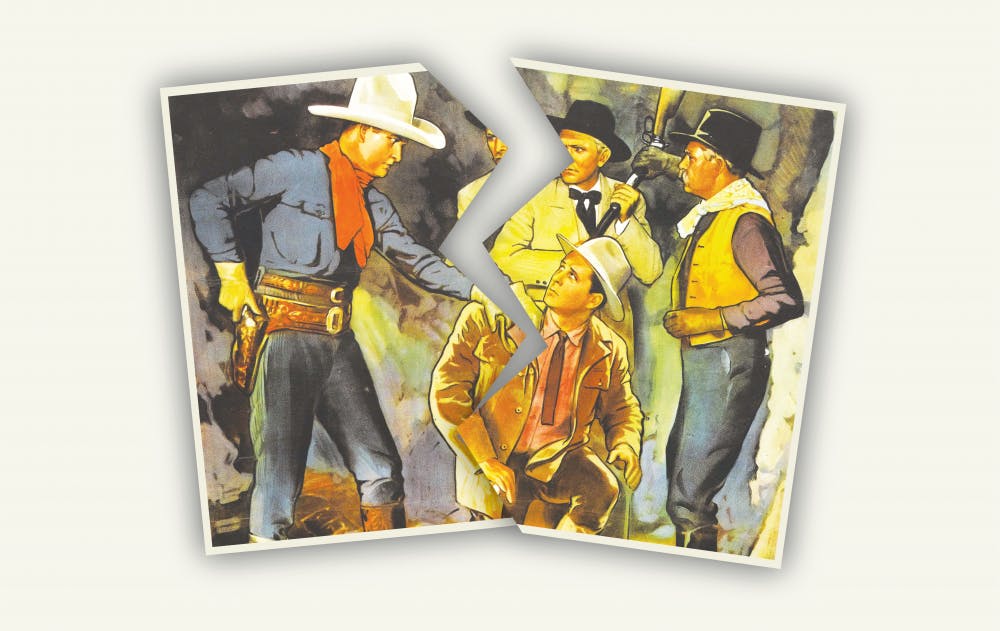
Matthew Yapp is a senior communications major and writes “Masculinquiries” for The Daily News. His views do not necessarily agree with those of the newspaper. Write to Matthew at mpyapp@bsu.edu.
What does it mean to be a man? I used to think I knew.
I think a lot of men used to think they knew, but times have changed.
Growing up, I thought masculinity was about physical strength. I was taught that being a man was about not crying, about protecting your women and providing for the family. Most little boys wanted to be cops, or superheroes or cowboys. Some unwaveringly strong figure who could come in and shoot down all the

Due to Chuck Norris' roles in films such as "The Delta Force" he has been regarded as a symbol of masculinity. Today, however, the traditional conception of masculinity is being challenged and some wonder if the example he set could lead to toxic traits. Wikimedia Commons, Photo Courtesy
‘bad guys,’ then rescue the damsel in distress and ride away with her into the sunset. I remember growing up watching movies where Chuck Norris would beat crooks to a pulp without even blinking. I watched John Wayne win shootout after shootout, cementing himself as picture-perfect example of manhood.
It used to be simple: These men with steely demeanors and unwavering grit were what we wanted to be.
However, the idea of masculinity is not simple anymore.
We’ve killed John Wayne, and with him, we have killed the traditional idea of what a man is supposed to be without providing an alternative.
Short-lived meninsim
I am a feminist. I’ve always believed there needs to be absolute equality between genders in all aspects of our lives. This is why in 2017 when the #MeToo movement started, I stood in solidarity with everyone who shared their stories. This is why I went to the Women’s March in 2018 to show my support for those calling for change.
Because of my stance as a feminist, I was wildly annoyed in 2015 with the rise and quick fall of “meninism.” Meninism was created as a response to feminism and the perception that feminism was anti-men. The vast majority of meninism focused on degrading women, and very little of it actually had to do with fighting for men. Rather, it just wanted to tear down women’s movements. I knew I didn’t believe in the things meninism stood for — the idea that feminism was anti-men and harmful.
But meninism being brought up into mainstream culture did make me stop and ask, “How did I, as a man, fit into feminism? And what did it mean to be a ‘good man?'”
While its notoriety was short-lived and I despised what it actually stood for, I was left with a deep belief that meninism had the potential to be exactly what men needed if it would’ve been healthy. I don’t think the way it existed could actually help anyone, but I do think the idea of a sort of “men’s rights movement” could have merit.
Let me clarify — I don’t think men need laws passed for their protection or need to fight for workplace equality. Rather, I think men require a social push to change our ideas on how we interact with others in order to undo the harmful perceptions placed on us as a result of traditional, and sometimes toxic, masculinity.
We are failing young men in our country. They are desperately in need of help, and we are failing to give it to them because, for many, we frankly don’t like to recognize what has happened to them. Many of the ideals and attitudes taught to them from a very young age were toxic. From the ways they handle their emotions to the way they treat women, some men were completely misinformed on how to navigate the world.
Now these toxic behaviors are starting to be pointed out and receive vocal outcry, and many men are reeling as a result.
What men need right now is people mature enough to discuss the perplexity and nuances of gender relations in 2019. This is why I think there is not a necessity for a “men’s right’s movement” but rather a necessity for more awareness from men, for men and by men. Culturally, men must take the time to evaluate the perception of the male gender, and removing the negative feelings around it may be useful.
Solutions sought
Changing male behavior to move away from these toxic tendencies is something that would be a mutually-beneficial move for men and women.
According to the American Foundation for Suicide Prevention, men were 3.5 times more likely to die by suicide than women in 2017. Men are also more likely to use and become addicted to almost all types of illegal substances, according to the National Institute of Drug Abuse. This is not even to mention that across the board, men are significantly more likely to commit violent crimes than women. Most notably, in my opinion, nearly all mass shooters are male.
The traditional idea of masculinity was toxic for many. The John Waynes and Chuck Norris-types of the past were not great role models for all men as they created what seemed, to some, to be emotionless and violent figures that created dynamics of ownership and objectification toward women and children. I am genuinely happy and grateful that we have taken strides in the past few years to move away from that, and feminism has been a big part of this.
Feminism has done a great job at highlighting and addressing the harm toxic masculinity has caused. Many men, however, felt comfortable in traditional masculinity and see feminists' attack on it as an attack on themselves.
While I by no means am trying to make men think they are villains or wrong for their feelings, I do need to emphasize that I believe some of these men are misguided and need to do a better job at taking responsibility for why they’re in this position. I think feminism has had an unintended consequence, though it has done amazing things for the world and for people regardless of gender.
Role models and the #MeToo movement
However, an unintended consequence is that men are now left with the question of who they are.
In the past several years, several men who have been thrust into the limelight have been less than inspirational. Folks like Harvey Weinstein and Kevin Spacey are dominating the conversation, making it seem like the entire gender is something deserving of critique.
These ideas combined create a sense for some men that they have somehow become worse than women.
Because of this sense that we are critique-worthy, it seems a lot of men genuinely feel rather villainized and, in a sense, victimized. A Randstad US survey conducted in 2019 concluded that 46 percent of those polled held negative views toward movements like #MeToo and the feminist movement. The same amount of men said they no longer know what is an appropriate compliment to give coworkers without it being misinterpreted as sexual harassment. I’ve spoken to a variety of male friends who discuss how they feel like the #MeToo movement is painting our entire gender in a negative light. That is not representative of men as a whole, and I understand where they are coming from.
While I find the #MeToo movement necessary and good, I can understand how it would be frightening for some men to face. Imagine the people you looked up to your whole life are suddenly being torn down and, in some cases, revealed to be rapists or sexual harassers. It’s good that criminals are being brought into the light, but by no means does that make it come as any less of a shock to their fans.
I am not someone who believes the feminist movement is attacking me. However, I do absolutely sympathize with those who do. These men are perceiving that a large portion of the world is against them. They feel like they have to be on the defense because, in their minds, their way of life is being attacked, and that feeling would be harmful to someone's self esteem. I don’t share the views of these people, but I genuinely would like to get them some help.
We told men what they could no longer be without telling them what they should be, and it’s caused a lot of confusion.
However, I think the idea of redefining the needs of a men’s rights movement is crucial.
This is necessary, not in the sense that men’s legal rights are being tread upon, but rather there are certain social and societal expectations that need to be taken apart.
When I say men’s rights, it’s not about a right to vote or workplace equality as these norms were long ago established. Rather, there needs to be a movement toward reestablishing a man’s place in society and how they can have better relationships with women based on equality.
Moving forward
Men need to come together and talk about why we feel this way. Rather than playing the blame game and criticizing women for pointing out our flaws, we need to discuss how to grow and move forward. I think if we stopped focusing so much on how certain men are now facing scrutiny and it makes us feel bad, we could focus on good examples of men who are still good role models.
Whether it be Keanu Reeves or Idris Elba, there are still plenty of men who maintain previously held masculine ideals but also don’t shy away from emotion or vulnerability like certain men of the past did. By focusing on good examples of men and masculinity and having a movement which highlights these types of men, perceptions of what men are can shift.
Many men feel as though a small segment of the male population has given us all a bad rap, a few bad apples spoiling the bunch. What must be recognized though is that whether they were consciously doing it or not, they were contributing to a culture of unhealthy masculinity and the discomfort of women. Most men are not rapists or trying to actively oppress women. Many women, however, still are oppressed by the culture of masculinity that men, in part, have fostered. So, to that point, I say to men: It is not your fault, but it is your problem.
Men, to make up for what some have done and what many have cultivated, we must begin to act with organized intention to make up for the issues women have had to live with for quite some time.
It will take men banding together, not just with our own gender, but with women as allies rather than adversaries. It will take us working as a unit toward something better for how we are perceived and how we act.
John Wayne is dead. There is no way to revive him. The men we see clinging to the ghost of what traditional masculinity created are fighting for something that cannot and should not come back. What they should be fighting for, however, is something new — a different idea of what men are and what we can be.
If we want to rid ourselves of the burdens of the perceptions created by the men before us, we have to treat people differently and be more conscious of how we act.
It is time we stop acting the way men have been and start acting the way men should be.





